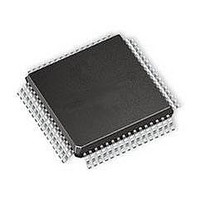MC908LJ12CFUE Freescale Semiconductor, MC908LJ12CFUE Datasheet - Page 282

MC908LJ12CFUE
Manufacturer Part Number
MC908LJ12CFUE
Description
IC MCU 12K FLASH 4/8MHZ 64-QFP
Manufacturer
Freescale Semiconductor
Series
HC08r
Datasheet
1.MC68HC98LJ12CFUE.pdf
(414 pages)
Specifications of MC908LJ12CFUE
Core Processor
HC08
Core Size
8-Bit
Speed
8MHz
Connectivity
IRSCI, SPI
Peripherals
LCD, LVD, POR, PWM
Number Of I /o
32
Program Memory Size
12KB (12K x 8)
Program Memory Type
FLASH
Ram Size
512 x 8
Voltage - Supply (vcc/vdd)
3 V ~ 5.5 V
Data Converters
A/D 6x10b
Oscillator Type
Internal
Operating Temperature
-40°C ~ 85°C
Package / Case
64-QFP
Processor Series
HC08LJ
Core
HC08
Data Bus Width
8 bit
Data Ram Size
512 B
Interface Type
SCI, SPI
Maximum Clock Frequency
8 MHz
Number Of Programmable I/os
32
Number Of Timers
4
Maximum Operating Temperature
+ 85 C
Mounting Style
SMD/SMT
Development Tools By Supplier
FSICEBASE, M68EML08LJLKE, ZK-HC08LX-A, M68CBL05CE
Minimum Operating Temperature
- 40 C
On-chip Adc
10 bit, 6 Channel
Lead Free Status / RoHS Status
Lead free / RoHS Compliant
Eeprom Size
-
Lead Free Status / Rohs Status
Details
Available stocks
Company
Part Number
Manufacturer
Quantity
Price
Company:
Part Number:
MC908LJ12CFUE
Manufacturer:
Freescale Semiconductor
Quantity:
10 000
Company:
Part Number:
MC908LJ12CFUER
Manufacturer:
Freescale Semiconductor
Quantity:
10 000
- Current page: 282 of 414
- Download datasheet (5Mb)
Serial Peripheral Interface Module (SPI)
14.8 Error Conditions
14.8.1 Overflow Error
Technical Data
282
For an idle master or idle slave that has no data loaded into its transmit
buffer, the SPTE is set again no more than two bus cycles after the
transmit buffer empties into the shift register. This allows the user to
queue up a 16-bit value to send. For an already active slave, the load of
the shift register cannot occur until the transmission is completed. This
implies that a back-to-back write to the transmit data register is not
possible. The SPTE indicates when the next write can occur.
The following flags signal SPI error conditions:
The overflow flag (OVRF) becomes set if the receive data register still
has unread data from a previous transmission when the capture strobe
of bit 1 of the next transmission occurs. The bit 1 capture strobe occurs
in the middle of SPSCK cycle 7. (See
an overflow occurs, all data received after the overflow and before the
OVRF bit is cleared does not transfer to the receive data register and
does not set the SPI receiver full bit (SPRF). The unread data that
transferred to the receive data register before the overflow occurred can
still be read. Therefore, an overflow error always indicates the loss of
data. Clear the overflow flag by reading the SPI status and control
register and then reading the SPI data register.
OVRF generates a receiver/error CPU interrupt request if the error
interrupt enable bit (ERRIE) is also set. The SPRF, MODF, and OVRF
•
•
Overflow (OVRF) — Failing to read the SPI data register before
the next full byte enters the shift register sets the OVRF bit. The
new byte does not transfer to the receive data register, and the
unread byte still can be read. OVRF is in the SPI status and control
register.
Mode fault error (MODF) — The MODF bit indicates that the
voltage on the slave select pin (SS) is inconsistent with the mode
of the SPI. MODF is in the SPI status and control register.
Serial Peripheral Interface Module (SPI)
Figure 14-4
MC68HC908LJ12
Freescale Semiconductor
and
Figure
14-6.) If
—
Rev. 2.1
Related parts for MC908LJ12CFUE
Image
Part Number
Description
Manufacturer
Datasheet
Request
R
Part Number:
Description:
Manufacturer:
Freescale Semiconductor, Inc
Datasheet:
Part Number:
Description:
Manufacturer:
Freescale Semiconductor, Inc
Datasheet:
Part Number:
Description:
Manufacturer:
Freescale Semiconductor, Inc
Datasheet:
Part Number:
Description:
Manufacturer:
Freescale Semiconductor, Inc
Datasheet:
Part Number:
Description:
Manufacturer:
Freescale Semiconductor, Inc
Datasheet:
Part Number:
Description:
Manufacturer:
Freescale Semiconductor, Inc
Datasheet:
Part Number:
Description:
Manufacturer:
Freescale Semiconductor, Inc
Datasheet:
Part Number:
Description:
Manufacturer:
Freescale Semiconductor, Inc
Datasheet:
Part Number:
Description:
Manufacturer:
Freescale Semiconductor, Inc
Datasheet:
Part Number:
Description:
Manufacturer:
Freescale Semiconductor, Inc
Datasheet:
Part Number:
Description:
Manufacturer:
Freescale Semiconductor, Inc
Datasheet:
Part Number:
Description:
Manufacturer:
Freescale Semiconductor, Inc
Datasheet:
Part Number:
Description:
Manufacturer:
Freescale Semiconductor, Inc
Datasheet:
Part Number:
Description:
Manufacturer:
Freescale Semiconductor, Inc
Datasheet:
Part Number:
Description:
Manufacturer:
Freescale Semiconductor, Inc
Datasheet:











